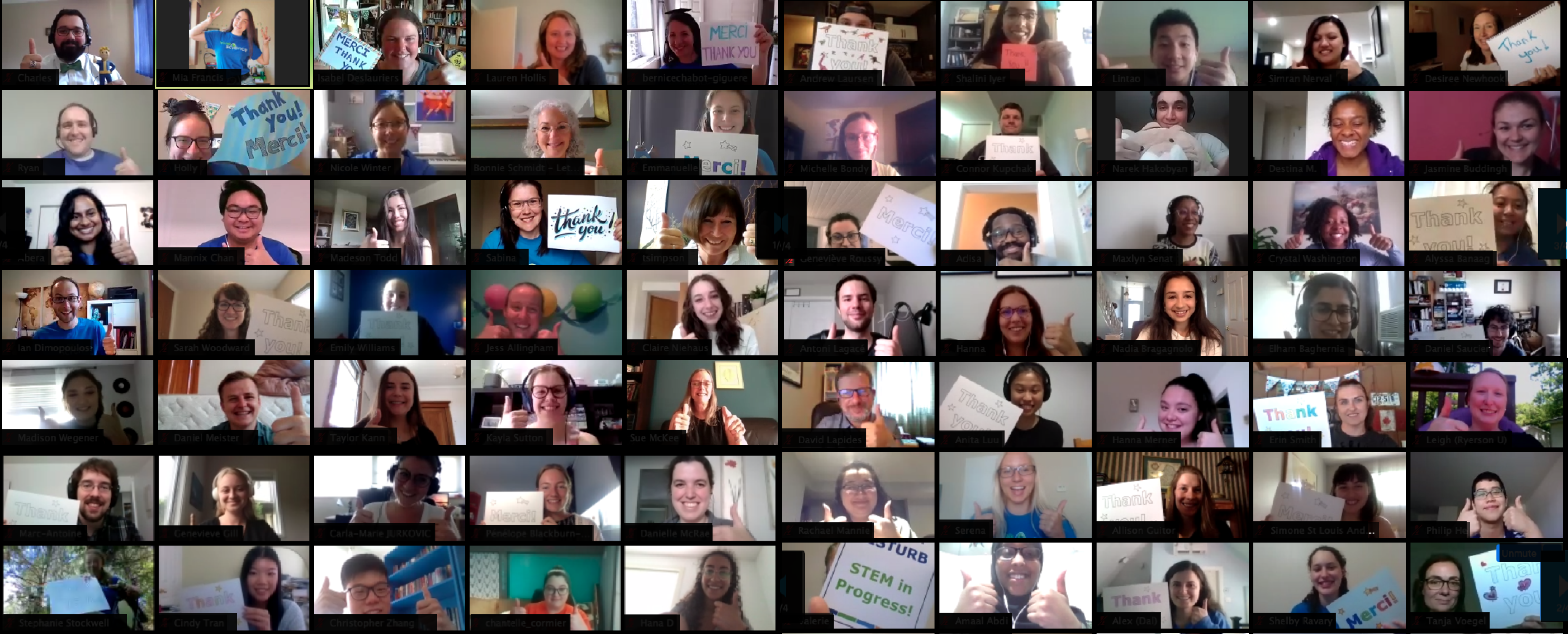Creativity Delivers Inspiring Outreach Efforts
Science demands creativity. So do the methods to teach it.
Before COVID hit, Chris Murray was visiting more than 50 classes per semester around Orillia as a Let’s Talk Science volunteer. When schools shut down in the spring of 2020, Murray, an associate professor of physics and sustainability sciences at Lakehead University, took his lessons online.
One Grade 11 environmental science class (pictured above), in Orillia, took part in a weekly Let’s Talk Science virtual workshop with Murray. Normally, Lakehead would provide the materials needed for the hands-on activities. Instead, Murray had the students improvise, like making water filters from whatever they could find around their homes. Having to scramble like that was a lesson for the students too.
“It gives them a chance to be innovative,” Murray told a local newspaper. “Everybody’s coming to the activity with different things, depending on what they have around them.”
The idea that necessity is the mother of invention certainly applies to Let’s Talk Science Outreach during the pandemic. And just as volunteers like Murray found ways to keep supporting students, Let’s Talk Science discovered new means of engaging volunteers.
Shifting Outreach Online
Most volunteers are post-secondary students dealing with the disruption of their own studies. Still, several sites offered virtual outreach to students.
For example, Let’s Talk Science Outreach at the University of Toronto, along with the Canadian Cancer Society, hosted a Let’s Talk Cancer symposium online from May 28-29. This was a first for the 5th annual event, and it made the learning accessible to Grades 11-12 students from across Canada.
More than 200 students attended the sessions via Zoom. They learned about the basics of cancer, the challenges clinicians and researchers face, and new and exciting tools being developed for detection and treatment.
Sue McKee had to figure out quickly how to go virtual, too. She’s the Director of the Let's Talk Science Outreach program in Ottawa, for the University of Ottawa and Carleton University. In normal times, volunteers would offer youth in-person learning in their classrooms. Or students would go to the campuses to explore, like a visit to the coral reef fish tank at the University of Ottawa.
“All of that has changed to virtual,” says McKee.
Some outreach involved dropping off materials to schools and doing lesson plans virtually. McKee’s team also targeted youth in lower socio-economic areas, by delivering science kits (like everything you need to make a kaleidoscope) through community centres and other partners.
After the pandemic hit, one of McKee’s early outreach efforts was with Inuuqatigiit, the Centre for Inuit Children, Youth and Families. Ordinarily, Let’s Talk Science would go to their after-school program every week for hands-on programs. Instead, McKee developed videos that Inuuqatigiit could use to guide activities. The young people could easily do experiments at home, like gathering different items that a bird could use to build a nest, from cotton balls to sticks. Which pile would disappear faster?
Household science became a common theme. Many Let’s Talk Science Outreach volunteers created videos with fun DIY experiments. One on YouTube, from a McGill University microbiology and immunology student, showed how to extract DNA from a banana. All you need is a baggie, dish soap, water, a coffee filter and rubbing alcohol.
It was yet another example of how outreach activities can have a significant impact, despite challenging times.
National Volunteer Conference moves online
Over 150 Let’s Talk Science Outreach site coordinators gathered virtually in June for the annual National Conference. It became the largest multi-day training event in the outreach program’s history.
“Cannot wait to see and hear what all the sites were able to accomplish come next year,” said one volunteer. “This was my first Let's Talk Science Conference and I really enjoyed it. Even if it was virtual, it still felt like I truly got to 'meet' a lot of awesome people."
Let’s Talk Science Outreach connects young people with thousands of volunteers to engage in science, technology, engineering and math (STEM) learning opportunities. These role models inspire youth to think about their future in STEM. Thanks to their quick response and the use of technology, Let’s Talk Science was able to provide meaningful professional development during the virtual conference.

